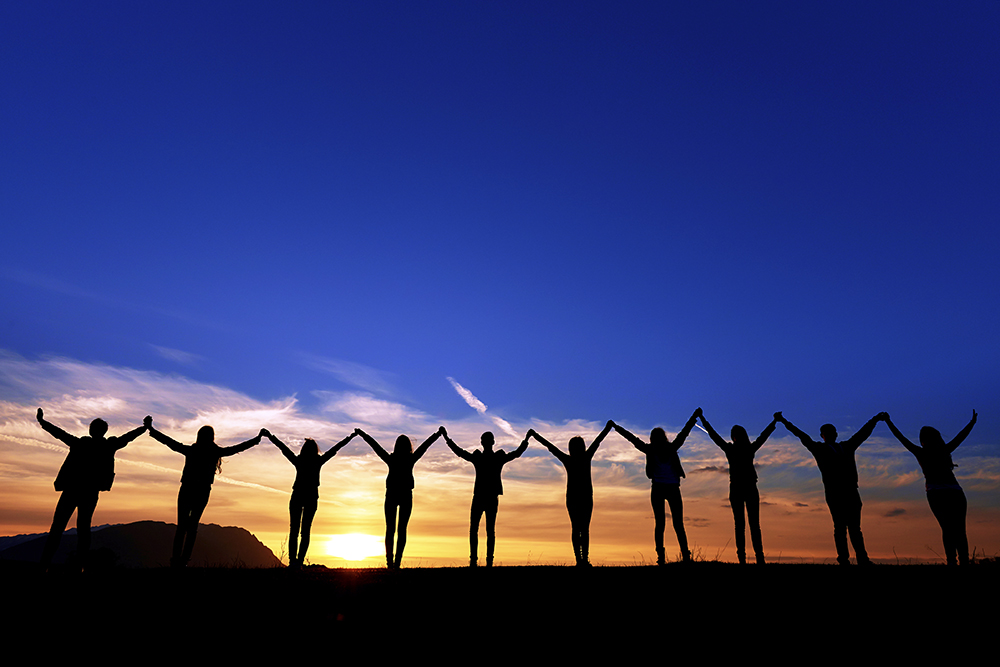Finding hope after Brexit
Reeling from the recent developments in British politics, writer Cheryl Rickman finds a way to see things differently when the Referendum didn't go the way she'd hoped

I am a resilient optimist. I didn’t answer a few questions in one of those personality tests on Facebook to know this. But I do have a tendency to look on the bright side. I’ve also found the strength to bounce back from tragic circumstances in my life, I’m an Ambassador for Wellbeing and author of a book about flourishing. Yet, a few days after the Brexit referendum, the #dealwithit posts made me feel far from resilient; more dismayed, angry and bemused.
'Struggling well', is one definition of resilience and I wasn’t. In fact, I was torn. On one hand, I wanted to accept the result and move forward positively but, on the other, I felt compelled to stand up for what I believed in and express myself about the injustice of all. Nope, taking this lying down didn’t sit right with me. I wondered whether it was possible to fight with both passion and compassion, or was that an oxymoron?
Four days post-Brexit, someone commented they’d been ‘shocked at my reaction', given I usually see the best in situations. I was upset, because I felt like such a hypocrite. A few days prior to the referendum, I’d made a heartfelt plea in my newspaper column for 'love over hate'. Yet, here I was being ignorant enough to call everyone who had 'done this to our country', ignorant. Doh! I apologised instantly for what I had said in the heat of the moment, but I still felt like a charlatan.
As well as learning never to post on social media immediately on waking to bad news (especially pre-coffee) I also learned that it was passion and some very natural human tendencies that had fuelled my disdain. I also knew that, as humans, we should allow ourselves to feel the full spectrum of our emotions. As Lotte Lane, author of Everything Is Awesome says, 'Feelings are meant to be felt. Even the icky, unfamilar, uncomfortable ones. Anger rallies people in to taking action – which can be positive. It also lets our politicians (yes, I'm looking at you Bojo) know that we're not going to take this lying down.'
Passion Leads To Action
She’s right. Passion is how movements and enterprises take flight. Passion empowers people and mobilises them towards taking positive action. It was passion that led me to launch ClimbingTreesKids.com with my 7-year-old daughter in a bid to give girls more choice after failing to find clothes she liked in the girls’ aisle. Telling me to #dealwithit would be suggesting I accept that dinosaurs are for boys and princesses are for girls. My passion provides me with the fuel to make my voice heard and campaign with LetClothesBeClothes to end gender stereotypes. Without passion neither would exist.
Yet, as well as feeling passionate, I couldn’t shake the sad feeling. I’d wake, remember the ‘out’ result and feel a sense of despair. Why couldn’t I keep calm and carry on? As well as pondering 'what was wrong with this country?’ I was also wondering what was wrong with showing up the way I usually do – brave face on, chin up. I couldn’t seem to ‘pull myself together’. Why was an ordinarily optimistic, resilient person epically failing at being so?
Nurturing empathy
As a current student of the CAPP (Certificate in Applied Positive Psychology) programme and a facilitator of my own Flourishing Workshops, I turned to the field of positive psychology to seek answers. I revisited the module on resilience and realised that one of the seven factors of resilience might be, in this strange instance, having the adverse affect. I realised I found it easier to bounce back from my own personal adversities than public, shared adversities. I had such strong empathy for everyone else facing this uncertain future, that I was struggling to cope. But, given that empathy is, according to The Resilience Factor by Karen Reivich and Andrew Shatte (Broadway Books, £11.33), one of seven keys to resilience, could I use it to my advantage instead?
By extending empathy to those who had voted ‘leave’, perhaps I could get through this. My passion had generated anger, perhaps compassion could generate some much-needed inner peace. So I sought to explore why those who voted to leave the EU were sufficiently fed up to do so, and how it must feel to have us ‘remainers’ pointing the finger of blame at them.
I read all I could find and asked people why they had voted leave, reserving all judgment. That day, I listened and, in doing so, I learned. That’s the only way we can figure out a way forward that takes both innies and outies (sorry, I realise we’re not belly buttons) from where they are now, a little bit closer to where they wish to be. What Brexit tells us more than anything is that many people are fed up with the way the world – our world – is being run. They want something different and we cannot ignore that.
Not all of the majority who voted against the status quo are wrong. If we assume they are, we won’t spot the similarities or find the common ground. We can learn a lot from the way coaches are trained to listen to people. First, they listen ‘to’ a person. Then they listen ‘for’ and ‘with’ the person and reveal that they aren’t just listening to the words being spoken, they are listening for the unspoken feelings, the values and vision in order to paint a bigger picture. If we do this with those who have voted the opposite way to us, we can easily find more commonalities around shared values and what matters to us all.
Most of us voted with the good intentions of protecting, enabling, securing and creating a better future. We may have diverse opinions about how to achieve those shared goals, but our wider values are the same. As such, we remain more connected rather than divided. Just as Jo Cox MP said before she was killed by a ‘Britain First’ fascist. 'We are more alike than different' regardless of our nationalities, skin colour or opinions. Ultimately, it was the Government’s failure to listen to the disenfranchised and the EU’s failure to listen to the needs of its member states that has led us to this result. And the 'leave' voters didn’t release the racism genie from the bottle – Nigel Farage and the media did. Finding the middle ground and tapping into our collective passion will help us to steer this, albeit abandoned ship, into safe harbour.
Cultivating optimism
My optimistic hope for the future had been seriously dented since the referendum result as its potential consequences were played out on air and on screen. Yet, I still held that belief deep down that things could change for the better, and that I could focus on what is controllable and make a change there. If I could take some positive action in making changes, I could regain some control.
So I started to research and write this article to help others and myself find a way through. I decided to channel my passion into action and signed a number of petitions. I also got a #SafetyPin to wear in support of an anti-racism campaign and wrote to my MP via writetothem.com and breentry.co.uk. I didn’t need to take this lying down, but I could act with compassion.
I could also choose how to view this situation. For, as philosopher Wayne Dyer said, 'if you believe it will work out, you'll see opportunities. If you believe it won't, you'll see obstacles'. So I focused on taking positive action, feeling optimistic that this has engaged more people in politics than anything before it; having hope that everything will be OK and, if it isn’t, feeling safe in the knowledge that we shall handle it. We’re British after all.
Re-Gaining Perspective
Causal Analysis was the next factor of resilience that I would focus on. This is the ability to gain perspective via flexible and accurate thinking about causes and implications of an event. I had been doing what all humans are wired to do when facing a negative situation – worry. The myth of worry is that worrying about the future prevents harm by preparing us to better solve problems. Only it doesn't. The truth is, worrying induces a state of stress and lowers cognitive performance. Rather than helping us problem-solve, worrying actually hinders our problem-solving abilities.
Turns out, while the suggestions to 'keep calm and carry on' might have been unwelcome, doing so was a valid compromise.
The next day I went on a gratitude walk. This gave me the chance to slow down and focus on all I had to appreciate. It also gave me the chance to practice some causal analysis and gain some perspective, by considering the most far-fetched worst-case scenario, then the equally unlikely best-case scenario and then the most-likely scenario of the situation. Yes, Farage could turn Europe against us, although I give the EU more credit than that, and yes our economy could nose-dive, along with our NHS and so forth. But, equally, there was still a chance that ministers might vote against the result or that a general election might be called.
However, what was most likely was that our economy might wobble, we’d still retain special relationships and build new, stronger, less-restricted ones with countries we’d been unable to before. Who knows, we might even get a leader who listens to the people, now they knew what was at stake when they didn’t. I took some of my more judgmental thoughts 'to court' and found more accurate ways of looking at things. I realised, if the worst-case scenario happened, which it was unlikely to, I would handle it, along with every other decent stronger-than- we-realise person in the UK.
It’s a useful worry-prevention tool – to remember that the adversity we face will not last forever and that, against all odds, we will handle it, just as we have always done in the past, just as we will again. So I recalled how I had been through far worse than this when I lost each of my parents and that our country had faced far worse, too. As a nation, we have been through world wars. This situation, while potentially bleak, is not as bad as that. We are not being bombed, our children are not being evacuated. When we/they were, we handled it. Now we shall handle this too.
Uncertainty Is Terrifying – But Useful
I was beginning to feel a lot better. I cracked on with my work and stayed away from the headlines, only designating myself a short period of ‘worry time’ to click through them and consider them, later that afternoon. I then reflected on the crux of all this shared heightened anxiety – UNCERTAINTY! Lack of political clarity and direction along with uncertainty about our country’s future had created a deep-seated unease. We needed confidence and stability to reassure markets, partners and ourselves.
And besides, uncertainty is a tricky state to inhabit. In a psychological experiment, when given the choice, the majority chose to be given an electric shock sooner rather than later, without warning; because they couldn’t bear the uncertainty of not knowing when it might happen.
That said, when have we ever known what is actually going to happen in the future? Stability doesn’t guarantee sustainability.
Nobody knows what the future holds. Brexit could result in the doom and gloom being reported, or perhaps in a more de-risked middle-ground kind of exit, with the UK being positioned outside of the EU but inside the European Economic Area (‘EEA’) and therefore not cut off from the single market after all. Who knows? Right now, we don’t. And it is that which terrifies us. Why? Because, as humans, we are hardwired for that reaction. When we’re exposed to uncertainty, our amygdala, the part of our brain that instigates fear and anxiety, lights right up. Consequently, it’s a mode of suffering that nobody enjoys.
What is especially interesting, given the Brexit fallout is that, as Jonathan Fields reveals in his book, Uncertainty: Turning Fear and Doubt into Fuel For Brilliance (Penguin, £10.99), 'uncertainty and fear of judgment go hand in hand'. No wonder the notion of the world collectively shaking its head at us in disapproval, adds another layer of despair to the one that uncertainty has already created. Essentially – this reaction to uncertainty and judgment is entirely normal and human. The good news is, if we can learn to see uncertainty as possibility, we can harness it to create worthwhile solutions.
Yes, uncertainty can be useful. So says Jonathan Fields: 'the more you’re able to tolerate ambiguity and lean into the unknown, the more likely you’ll be to dance with it long enough to come up with better solutions, ideas and creations.'
Furthermore, optimists tend to learn lessons from negative experiences, lessons they would never have learned without them. So that old cliché is true – what doesn’t break you really does make you stronger. Worth remembering.
Perhaps then, we should focus on that which we are certain about. For example, we know for sure that people were sufficiently unsatisfied with the status quo that the majority voted to change it. So, rather than blame, make rash decisions or generate hate, isn’t it wiser for us to pause and consider alternative methods of connecting with and listening to each other in this uncertain yet, likely brave new world? In doing so we can find common ground and unite to drown out the voices of the small pockets of racism which seek to destroy all that we’ve worked so hard towards.
Great Britain remains full of great people, passionate people, decent people. People who are the same people they were before they were forced to take this vote that has divided a nation. So how about we refuse to let it divide us any further? Let’s remember who we are. We have it within us to steer the ship in the direction that will suit us all best (i.e. away from hate) even if we have to go up a few less savoury creeks (possibly paddle-less) first.
Cheryl Rickman is author of The Flourish Handbook and The Flourish Colouring Book, both available on Amazon. She’s also an Ambassador of Wellbeing for The Network of Wellbeing, and a ghostwriter of business and wellbeing books. Visit www.CherylRickman.co.uk
Photograph: iStock









